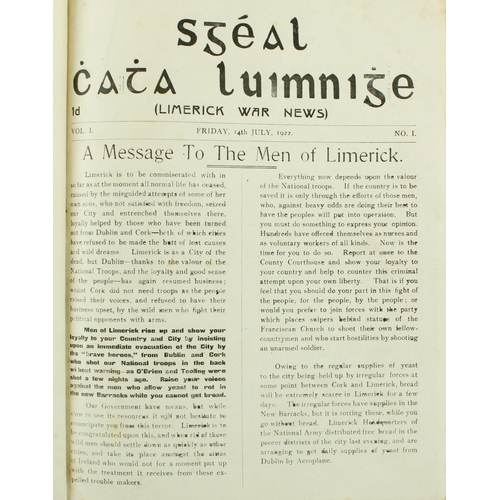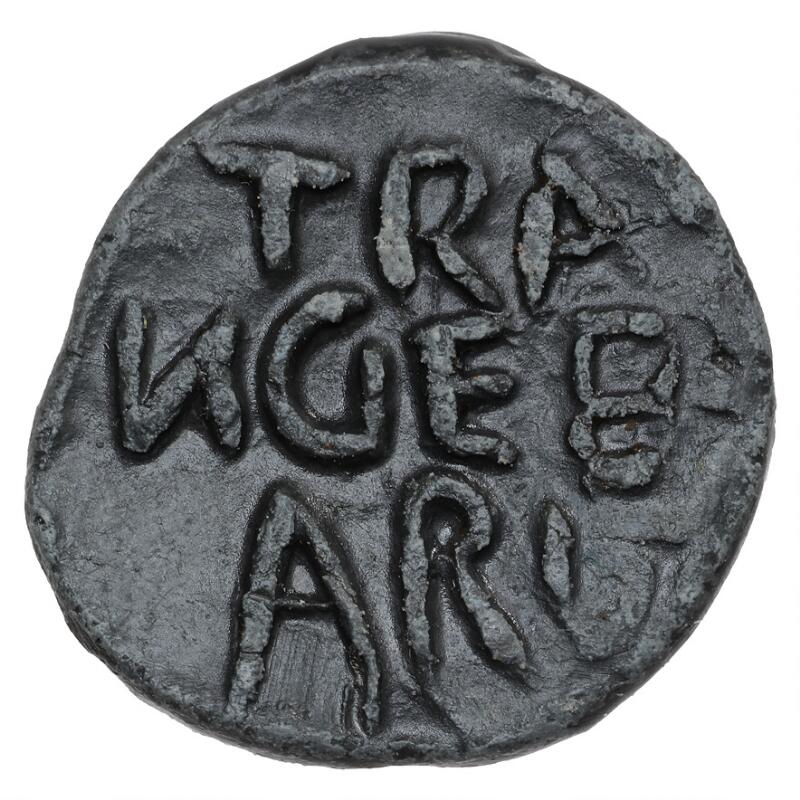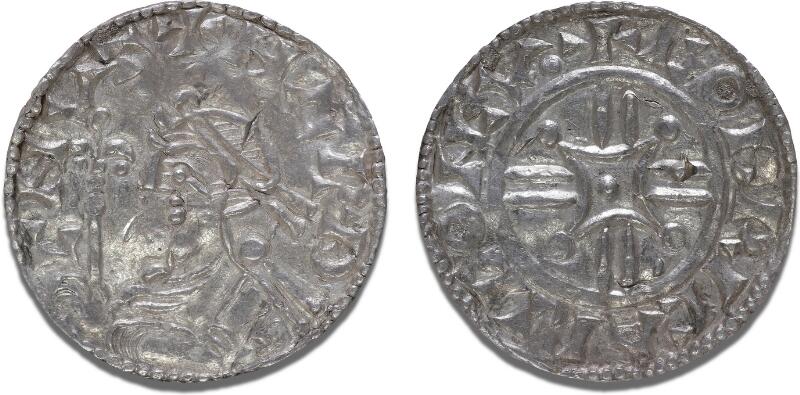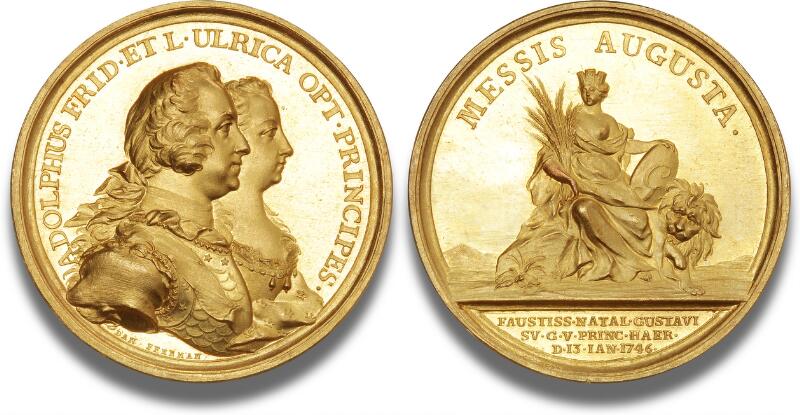The excessively rare C.Q.D. “Gold” Medal and Lloyd’s Life Saving Medal pair awarded to Captain J. B. Ranson, R.M.S. Baltic, who assisted in the rescue of over 1700 souls from the R.M.S. “Republic” and Italian liner “Florida”, following their collision off Nantucket in January 1909: this was the first occasion on which the “C.Q.D.” distress call had been sent by wireless transmission, a method encountered by Ranson once more on the night of 14 April 1912, when he responded to distress signals sent from the foundering Titanic - earlier that day he had alerted that ill-fated ship to the presence of icebergs but the relevant signal was pocketed by Bruce Ismay, White Star’s chairman Lloyd’s Medal for Saving Life at Sea, small type, silver (Capt. J. B. Ranson - S.S. “Republic”, 23 January 1909), in its fitted case of issue; C.Q.D. “Gold” Medal, silver-gilt, inscribed on the edge ‘J. B. Ransom’ (sic), onetime fitted with suspension loop, contained in its original wooden presentation box, the interior silk lining gold embossed with the recipient’s name, extremely fine and excessively rare, just four of the latter ever having been awarded (2) £2500-3000 Lloyd’s Medal for Saving Life at Sea: ‘The Silver Medal of the Society be bestowed upon Captain J. B. Ranson, R.N.R., as an honorary acknowledgement of his extraordinary exertions in contributing to the saving of life on the occasion of the steamships Republic and Florida being in collision in the vicinity of the Nantucket Lightship on the 23 January 1909.’ In addition to the above reward, and as a result of the gratitude of saloon passengers from the White Star’s Republic, Ranson also became the recipient of another medal, for the former elected to commission a special commemorative award to recognise the bravery of the seamen who had taken part in their rescue. With the backing of the American wrist-watch millionaire, Ralph Ingersoll, who agreed to undertake the striking and distribution of the awards in question, all crew members from the Baltic, Republic and Florida were duly presented with silver “C.Q.D. Medals”, while the three Captains involved in the incident, and Jack Binns, the Radio Officer of the Republic, received special “gold” issues. Joseph Barlow Ranson was born in Liverpool in 1860 and first went to sea as an apprentice, aged 14 years, on a British sailing vessel. A decade later he had risen to the command of a steamer of the Pacific Steam Navigation Company on the west coast of South America, and in 1892 he commenced full time employment with the White Star Line. He subsequently served in such famous ships as the Majestic, Britannic and Teutonic prior to taking command of the Baltic in 1907, which latter liner very much fitted the company’s ‘comfort-rather-than-speed’ policy, a strategy that would shortly be changed by the arrival of the “Olympic-class”. Footnote Fortuitously, his subsequent part in the Republic-Florida incident has been well-recorded in numerous reference works, and indeed in his own account of the affair which was published by The Outlook in February 1909, the editorial to that feature describing him as a man ‘of ruddy face, broad shoulders and elastic step ... a living testimonial to the healthfulness of the seaman’s life’. In brief, the White Star’s 15,400-ton Republic, bound for the Mediterranean with more than 400 winter sun-seekers aboard, and the 5,018-ton Lloyd-Italiano liner Florida, heading for New York with hundreds of emigrants on board, mainly refugees from the recent Messina earthquake, collided in thick fog south of the Nantucket Lightship in the early hours of 23 January 1909. Aboard the Republic, Radio Officer Jack Binns, unaware that he was making history, immediately sent the distress call C.Q.D. (“Come Quick, Danger”), and his message was picked up by the White Star’s own 24,000-ton Baltic through Marconi’s shore station at Siasconsett, Massachusetts. Captain Ranson was quick to react, later describing how he threw the helm hard a
The excessively rare C.Q.D. “Gold” Medal and Lloyd’s Life Saving Medal pair awarded to Captain J. B. Ranson, R.M.S. Baltic, who assisted in the rescue of over 1700 souls from the R.M.S. “Republic” and Italian liner “Florida”, following their collision off Nantucket in January 1909: this was the first occasion on which the “C.Q.D.” distress call had been sent by wireless transmission, a method encountered by Ranson once more on the night of 14 April 1912, when he responded to distress signals sent from the foundering Titanic - earlier that day he had alerted that ill-fated ship to the presence of icebergs but the relevant signal was pocketed by Bruce Ismay, White Star’s chairman Lloyd’s Medal for Saving Life at Sea, small type, silver (Capt. J. B. Ranson - S.S. “Republic”, 23 January 1909), in its fitted case of issue; C.Q.D. “Gold” Medal, silver-gilt, inscribed on the edge ‘J. B. Ransom’ (sic), onetime fitted with suspension loop, contained in its original wooden presentation box, the interior silk lining gold embossed with the recipient’s name, extremely fine and excessively rare, just four of the latter ever having been awarded (2) £2500-3000 Lloyd’s Medal for Saving Life at Sea: ‘The Silver Medal of the Society be bestowed upon Captain J. B. Ranson, R.N.R., as an honorary acknowledgement of his extraordinary exertions in contributing to the saving of life on the occasion of the steamships Republic and Florida being in collision in the vicinity of the Nantucket Lightship on the 23 January 1909.’ In addition to the above reward, and as a result of the gratitude of saloon passengers from the White Star’s Republic, Ranson also became the recipient of another medal, for the former elected to commission a special commemorative award to recognise the bravery of the seamen who had taken part in their rescue. With the backing of the American wrist-watch millionaire, Ralph Ingersoll, who agreed to undertake the striking and distribution of the awards in question, all crew members from the Baltic, Republic and Florida were duly presented with silver “C.Q.D. Medals”, while the three Captains involved in the incident, and Jack Binns, the Radio Officer of the Republic, received special “gold” issues. Joseph Barlow Ranson was born in Liverpool in 1860 and first went to sea as an apprentice, aged 14 years, on a British sailing vessel. A decade later he had risen to the command of a steamer of the Pacific Steam Navigation Company on the west coast of South America, and in 1892 he commenced full time employment with the White Star Line. He subsequently served in such famous ships as the Majestic, Britannic and Teutonic prior to taking command of the Baltic in 1907, which latter liner very much fitted the company’s ‘comfort-rather-than-speed’ policy, a strategy that would shortly be changed by the arrival of the “Olympic-class”. Footnote Fortuitously, his subsequent part in the Republic-Florida incident has been well-recorded in numerous reference works, and indeed in his own account of the affair which was published by The Outlook in February 1909, the editorial to that feature describing him as a man ‘of ruddy face, broad shoulders and elastic step ... a living testimonial to the healthfulness of the seaman’s life’. In brief, the White Star’s 15,400-ton Republic, bound for the Mediterranean with more than 400 winter sun-seekers aboard, and the 5,018-ton Lloyd-Italiano liner Florida, heading for New York with hundreds of emigrants on board, mainly refugees from the recent Messina earthquake, collided in thick fog south of the Nantucket Lightship in the early hours of 23 January 1909. Aboard the Republic, Radio Officer Jack Binns, unaware that he was making history, immediately sent the distress call C.Q.D. (“Come Quick, Danger”), and his message was picked up by the White Star’s own 24,000-ton Baltic through Marconi’s shore station at Siasconsett, Massachusetts. Captain Ranson was quick to react, later describing how he threw the helm hard a





.jpg)
.jpg)








Testen Sie LotSearch und seine Premium-Features 7 Tage - ohne Kosten!
Lassen Sie sich automatisch über neue Objekte in kommenden Auktionen benachrichtigen.
Suchauftrag anlegen